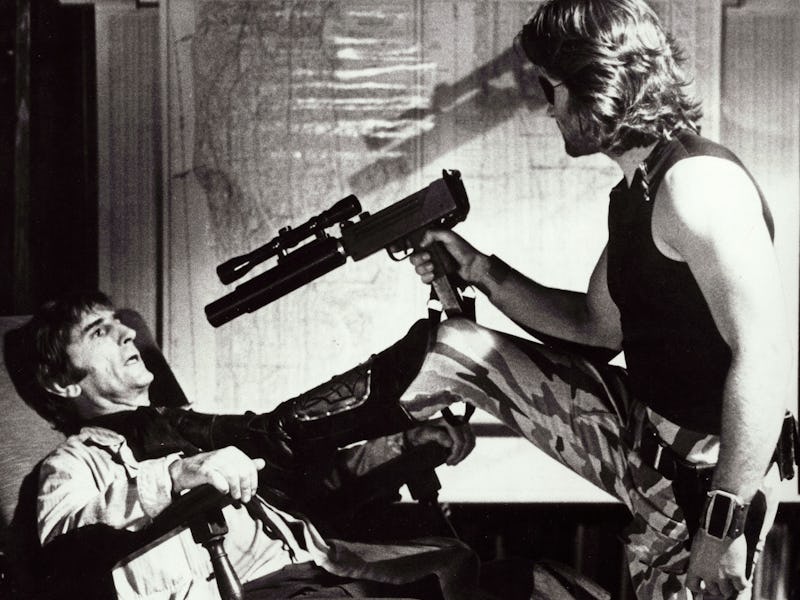John Carpenter’s Most Badass Movie Set the Tone for an Entire Decade
“Remember, once you're inside you're on your own.”

In 1981, not content with revolutionizing horror cinema with Halloween and following it up with the cult-classic The Fog, John Carpenter gave the world a film that would set the blueprint for ‘80s cinema — including action films and post-apocalyptic science fiction.
The release of Escape from New York, a low-budget flick set in a decaying New York, proved influential in myriad ways. The film tells the story of Snake Plissken (Kurt Russell), a Special Forces officer turned criminal facing federal charges in the then-future 1997. Snake is given a chance at redemption: the president has been kidnapped, and is being held by a gang in New York City. But this isn’t the glitzy New York we know today. In Escape, the city was turned into a walled-off prison nine years earlier. This also means Snake can find few trusted allies in his pursuit.
While there was precedent in post-apocalyptic cinema at the time, the world of Escape proved visceral and exciting, showing audiences a New York given over almost entirely to urban decay. It’s the kind of scene setting that visually and narratively impressed on films to come like Terminator and RoboCop. But the formula it tees up also feels similar to non-apocalyptic action films like Arnold Schwarzenegger’s Commando, where a hardened hero with a military background must go on an urgent rescue mission in places where allies and alliances may prove few and far between, and the stakes are quite deadly.
Kurt Russell’s turn as Snake transformed the former Disney actor into a formidable action star, and established his working relationship with Carpenter, which would yield a couple more cult classics in The Thing and Big Trouble in Little China. That sort of tough guy (in this case, with an eye patch and a grizzled disposition) established an archetype antihero for the decade. There’s a lineage from this film to Predator, the second Rambo movie, Jean Claude van Damme’s odd filmography, and more.
Sure, plenty of individual elements of Escape came from elsewhere. Few films arrive to us in a void. Snake can be traced right back to Clint Eastwood, and the decaying state of New York City at the time was a motif unto itself. (Think The Warriors, another cult classic set in the world of a Big Apple overrun with crime.) Even the post-doomsday world of marauders and few friends had an outback companion in Road Warrior. But like Halloween before, it was in how Carpenter combined those ingredients that helped establish an aesthetic ripe for the aping.
Along with influencing films now considered action and sci-fi classics, Escape From New York set off a series of low budget films like 2019: After The Fall of New York, 2020 Texas Gladiators, and 1990: The Bronx Warriors, proud ripoffs pulled from the gutters of Italian genre cinema, which never met a movie it didn’t want to plagiarize. But there are also strands of Escape’s DNA in films seemingly more far flung, like the anime classic Akira, and of course, the Metal Gear Solid video franchise grabbed liberally when designing its protagonist, Solid Snake.
Isaac Hayes in Escape From New York.
So what attribute does Escape have that really set the bar? In part, it may be the simplicity of this and other Carpenter films. Take a basic character like Michael Myers or Snake Plissken, and drop them in a familiar setting, whether it's the suburbs or a rough-around-the-edges city. Then add in Carpenter’s penchant for pulp, sci-fi, and horror, along with memorable scenery. A walk in the suburbs always feels like Michael Myers might be behind you, and scenes of urban decay bring our minds back to the apocalyptic aesthetic of films like Escape, themselves checking the pulse, temperament, and overall uneasy feeling of New York at the time (or any other city facing an urban collapse). It feels familiar and real.
Along with its myriad children, Escape from New York would get its own sequel in Escape from L.A., released in 1996 a few years after a city that experienced deep unrest following riots over a racist police incident and was in the midst of unease. While unevenly received at the time, that pairing of Carpenter and Russell has become a cult classic in its own right, and represents perhaps the last gasp of Carpenter’s career before a few films that never matched what came before. (Vampires and Ghosts of Mars have few defenders, although Carpenter still had a little life in him with a Masters of Horror episode called “Cigarette Burns.”)
On the dawn of a 4K limited release steelbook from Shout! Factory, it’s as good a time as any to revisit the world of Escape from New York, which will look better than ever.